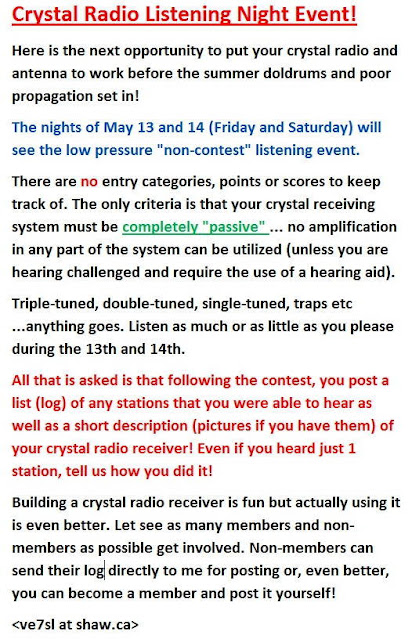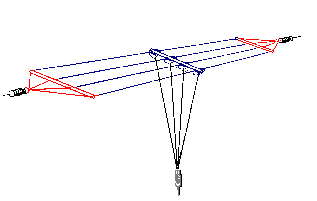It's CLE fun time once again.
'CLE's are 'Co-ordinated Listening Events, and NDB DXers around the world focus their listening time on one small slice of the NDB spectrum.
It's back to an 'almost normal' activity but with a slightly wider frequency span: 320.0 - 334.9 kHz.
When tuning for NDBs, put your receiver in the CW mode and listen for the NDB's CW identifier, repeated every few seconds. Listen for U.S. NDB identifiers approximately 1 kHz higher or lower than the published transmitted frequency since these beacons are modulated with a 1020 Hz tone approximately.
For example, 'AA' near Fargo, ND, transmitted on 365 kHz and its upper sideband CW identifier was tuned at 366.025 kHz while its lower sideband CW ident could be tuned at 363.946 kHz. Its USB tone was actually 1025 Hz while its LSB tone was 1054 Hz.
Often, one sideband will be much stronger than the other so if you don't hear the first one, try listening on the other sideband.
Canadian NDBs normally have an USB tone only, usually very close to 400 Hz. They also have a long dash (keydown) following the CW identifier.
All NDBs heard in North America will be listed in the RNA database (updated daily) while those heard in Europe may be found in the REU database. Beacons heard outside of these regions will be found in the RWW database.
From CLE organizers comes the following CLE info:
Hello all,
Here are all the details for this weekend's co-ordinated listening event.
First time CLE logs too? Yes, please!
Short logs are always as welcome as long ones.
Days: Friday 22 April - Monday 25 April
Times: Start and End at midday, your LOCAL time
Range: 320.0 - 334.9 kHz
Please log the NDBs you can positively identify that are listed in the frequency range, plus any UNIDs heard there too.
Send your CLE log to ndblist@groups.io with CLE279 and FINAL at the start of its title.
Please show on EVERY LINE of your log:
# The date and UTC (the day changes at 00:00 UTC).
# kHz - the beacon's nominal published frequency, if you know it.
# The Call Ident.
Show those main items FIRST on each line, before any optional details such as the NDB's Location, Distance, Offsets, Cycle time, etc.
As always, make your log meaningful to everyone by including your listening location and details of the receiver, aerial(s), etc.
It would be OK to use one remote receiver, with the owner's permission if necessary, provided that ALL your loggings for the CLE are made using it.
Joachim or I will send the usual 'Any More Logs?' email at about 19:00 UTC on Tuesday so that you can check that your log has been found OK.
Do make sure that your log has arrived on the List at the very latest by 08:00 UTC on Wed. 27th April.
We hope to complete making the combined results within a day or two.
You can find all CLE-related information from our CLE page ( http://www.ndblist.info/cle.htm ), including a link to the seek lists provided for this Event from the Rxx Database.
Good listening
Brian & Joachim
---------------------------------------------------------------------
From: Brian Keyte G3SIA ndbcle'at'ndblist.info
Location: Surrey, SE England (CLE co-ordinator)
---------------------------------------------------------------------
These listening events serve several purposes. They
• determine, worldwide, which beacons are actually in service and on-the-air so the newly-re-vamped Rxx online database can be kept up-to-date
• determine, worldwide, which beacons are out-of-service or have gone silent since the last CLE covering this range
• will indicate the state of propagation conditions at the various participant locations
• will give you an indication of how well your LF/MF receiving system is working
• give participants a fun yet challenging activity to keep their listening skills honedFinal details can be found at the NDB List website, and worldwide results, for every participant, will be posted there a few days after the event.The NDB List Group is a great place to learn more about the 'Art of NDB DXing' or to meet other DXers in your region. There is a lot of good information available there and new members are always very welcome. As well, you can follow the results of other CLE participants from night to night as propagation is always an active topic of discussion.You need not be an NDB List member to participate in the CLEs and all reports, no matter how small, are of much value to the organizers.Remember - 'First-time' logs are always VERY welcome!Reports may be sent to the NDB List Group or e-mailed to CLE co-ordinator, Brian Keyte (G3SIA), whose address appears above. If you are a member of the group, all final results will also be e-mailed and posted there.Please ... give the CLE a try ... then let us know what NDB's can be heard from your location! Your report can then be added to the worldwide database to help keep it up-to-date.Have fun and good hunting!


